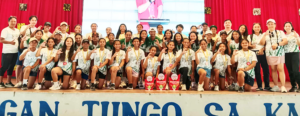
This hits close to home, that the journalist and the educator in me just won’t let this issue pass without giving my two cents. I am writing about incoming Presidential Communications Operations Office (PCOO) Chief Trixie Cruz-Angeles’ priority to legitimize bloggers and vloggers as members of the presidential press corps so that they can attend palace press briefings.
I would like to disabuse the minds of those who think that anyone who has a mobile phone, can take photos and can write just about anything on a social media page or a website with thousands or millions of followers can be categorized as a journalist. That is never the case.
Journalism is a profession and a craft that one painstakingly prepares himself/herself for years by going to school to learn the principles and theories, undergo workshops to master the craft and polish skills. Bloggers do not go to school to earn a degree in journalism or communication. There are a lot of bloggers and vloggers out there because anyone who has a mobile phone, take photos, shoot video and upload it on his social media page or website with thousands of followers can be one.
Legitimizing blogging as journalism blurs the distinction between the two. Why am I emphasizing this? It is because the discipline of verification is what clearly sets journalism apart from blogging.
As Bill Kovach and Tom Rosenstiel in “The Elements of Journalism” clearly put it, “Its (journalism) essence is a discipline of verification.” A journalist uses certain methods to evaluate and test information to get it right. This simply means that journalists do not and cannot simply rely on information provided by a single source or will they ever swallow anything from a source hook, line and sinker. Bloggers and vloggers can conveniently write a story based on a press release that is provided by a personality or an organization that wants to promote their interests.
Kovach and Rosenstiel even made it clear that while the concept of objectivity did not imply that journalists were free of bias, because they must make decisions, he or she cannot be objective. But journalism methods are objective. Journalism calls for a consistent method of testing information, a transparent approach to evidence so that cultural and personal biases will not affect accuracy.
Journalists triangulate sources. It is the conscious habit of those involved in journalism to seek witnesses, disclose as much as possible about sources and ask various sides for comment. All these signal such ethical standards. This discipline of verification is what separates journalism from other forms of communication such as propaganda, advertising and blogging.
Cruz-Angeles’ priority reminds me of Pres. Rodrigo Duterte’s Communication Secretary Martin Andanar’s interim policy for accrediting bloggers as members of the press corps in 2017. He was quoted as saying it was because they were “a major factor” in the president’s successful campaign.
This leads me to my second point: the press is considered as the Fourth Estate because of its watchdog function. The Press is there to fiscalize the government, point out its misgivings and expose anomalies. How can these bloggers (if they get accredited as members of the press corps) perform such function and protect the interest of the people when they are obviously for the one who is in power?
The second principle of Journalism: Its first loyalty is TO CITIZENS.
I am also bothered by Cruz-Angeles not being able to give a definitive answer when asked if all journalists and media groups will be allowed to be physically present to cover events graced by President-elect Ferdinand Marcos, Jr. She was quoted in Inquirer.net saying, “I think we’ll have to take a look at existing policies first and determine and make a decision later on as to how appropriate they are for the current time. We’ll have to wait and see pending a review of all existing policies regarding the coverage in Malacañang.”
It has been reported that some journalists were sidelined during the (election) campaign because they were perceived biased against the president-elect and cited for allegedly spreading “fake news” or false information. I hope my hunch is wrong.
As for me, blogging and vlogging should not and can never be considered journalism.*







